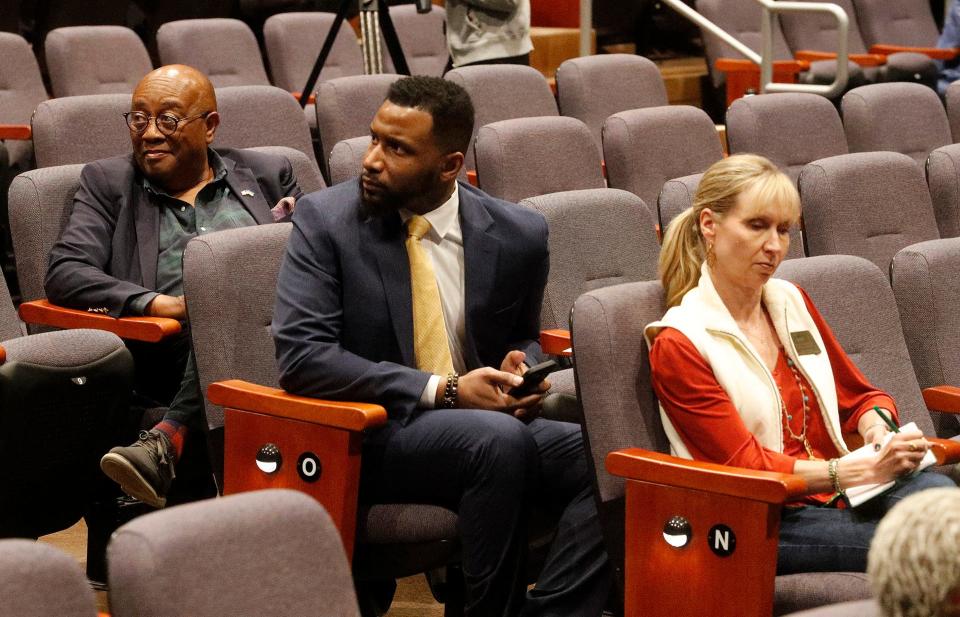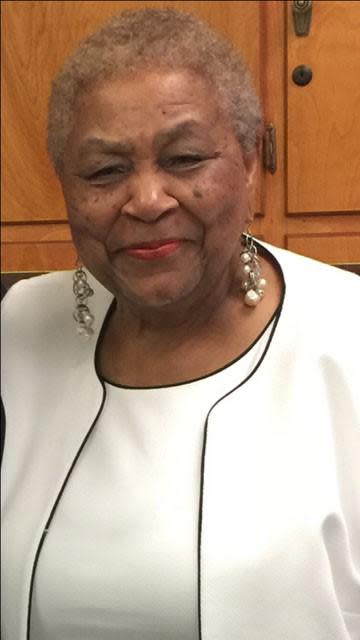Two-thirds of elementary students cannot read at grade level. The district plans to fix it
Faced with stark evidence that nearly two-thirds of elementary school students in Savannah-Chatham County public schools (SCCPSS) are not reading at grade level, the district's literacy task force made recommendations on how to improve reading and writing skills for the community's youngest learners. The task force report was presented to the SCCPSS Board of Education during its annual retreat on March 24.
Hiring district-level literacy specialists, dedicating 120 minutes a day to literacy instruction (in all grade levels), new textbooks and resources, and a renewed emphasis on teacher trainings were some the top recommendations from the task force's draft presentation. The formal report will be presented at the April 12 School Board meeting, where the public will be able to comment on the recommendations.
The task force convened in October 2022 and was staffed by district-level administrators. The taskforce was "charged with building a collective understanding of K-12 literacy best practices to make recommendations that would increase the number of students reading on grade level districtwide."
The recommendations are anchored by five areas: parent and community partnerships, teacher preparation, professional development, instructional strategies, and selection of educational materials.
![Bess Butler reads to first graders at May Howard Elementary School as her 92-year-old grandfather, Lee Butler watches. The students in Lisa Martin’s class heard “Little Bear” as part of the Rotary Read-In program. [Steve Bisson/savannahnow.com]](https://s.yimg.com/ny/api/res/1.2/.Cygwqi59ptlZuuD1I6ybA--/YXBwaWQ9aGlnaGxhbmRlcjt3PTk2MDtoPTg0Ng--/https://media.zenfs.com/en/savannah-morning-news/5706978a8ec8837707196555b559151e)
Savannah-Chatham superintendent search:Firm hired for search, forums seek public insight
And while Bernadette Ball-Oliver, SCCPSS deputy superintendent of teaching and learning, said the district recognizes improving reading scores across the county cannot be solved with "one-size-fits-all" mentality, many board members pressed the district to hone in more on struggling schools and classrooms.
"I might think about spending the money to put paraprofessionals in these classrooms where the teachers are struggling and (students) are not behaving because they are frustrated because they don't understand," said SCCPSS Board Member Cornelia Hall, District 3. "So, you need to consider that as you're putting more and more money into programs. People make a difference."
Why is SCCPSS addressing the literacy rate?
During the 2021-2022 school year, SCCPSS reported that only 34% of elementary school students were reading at or above grade level, the measure of literacy for students in grades 3-8.
And according to district-level data, 49% of elementary school students ranked as the lowest-level learners on state-mandated English end-of-grade exams.
In SCCPSS schools, Black and economically disadvantaged elementary students are far behind their white counterparts, with three-in-four children failing to achieve grade-level literacy, according to the Georgia Department of Education. The state tracks achievement data by school and by race, poverty status, English proficiency, and disabilities.
![First grader Chelsea Page at May Howard Elementary School holds her teddy bear and reads her new book. The bear and book were gifts of Bess Butler and her grandfather Lee Butler who were at the school as part of the Rotary Read-In project. [Steve Bisson/savannahnow.com]](https://s.yimg.com/ny/api/res/1.2/GKXQDJWtEulnzHArxPawtw--/YXBwaWQ9aGlnaGxhbmRlcjt3PTk2MDtoPTc3Mw--/https://media.zenfs.com/en/savannah-morning-news/3440572064bdabe2bafbf5121f3fda05)
In Chatham County, 55% of white elementary students read at or above grade level compared to 24% of Black students, according to the state. The district reported that only 16% of elementary students with disabilities were reading at grade level.
Lawsuit:Former school administrator alleges retaliation for whistleblowing
The trends are on-par with the state of adult literacy in Georgia at 84%, one of the lowest rates in the country, according to Atlanta-based nonprofit, Literacy For All.
Literacy rates are often tied to other socioeconomic factors such as poverty. In addition to behavioral issues and chronic absenteeism, students struggling with literacy are also prone to earn less than their peers after leaving school.
How will SCCPSS raise literacy rates?
The report was aimed at academic implementations only, but there is a larger district focus on addressing the root causes to many of the issues impacting schools like poverty, behavior, mental health and truancy.
Read the draft report:
Here are a few of the recommendations, which are not subject to board approval:
Two-day literacy conference for teachers during the summer
Continued professional development, some with stipends, for teachers throughout the school year
Dyslexia screening trainings
Emphasis on explicit phonics instruction
Solicit the local nonprofit DEEP Center to implement another writing program within the schools
Update the literacy plan for grades 6-12
Partner with Parent University to provide adult literacy courses
Expand partnerships with the Live Oak Library System
Track school- and teacher-specific literacy data to see what's working, and where additional help is needed
Hire six district-level literacy specialists
Re-evaluate funding to allow school principals to hire more early-intervention specialists
Form a committee to look at purchasing new textbooks and educational materials
The classroom tenant of the plan requires teachers to provide two hours of literacy instruction every day, with a focus on guided instruction, out-loud reading and writing. The district will send out sample schedules for how schools can program the "instructional block," but the organization and lesson planning will be up to the schools' and teachers' discretions.
The in-classroom recommendations will be implemented at every school and every grade level.

The task force's recommendations leaned heavily on the Science of Reading, a research-based learning method that approaches reading instruction with an emphasis on phonics (learning to read by understanding the sounds of letters and words to comprehend writing.) The emphasis is a change from the district's use of balanced literacy, an opposing method of reading instruction that relies on a combination of instructional methods.
For Subscribers:Savannah-Chatham Schools examine where to grow as populations shift, facilities age
Ball-Oliver said the recommendations highlight a combination of several teaching methods, not a strict adherence to any one theory.
She added that schools and teachers should identify students as early as possible who need additional help, whether that's by hiring more in-classroom paraprofessionals or restructuring elementary grade levels to have teachers who focus solely on teaching reading.

Outgoing superintendent Ann Levett ensured the district will connect with universities they work with to ensure education programs are adequately preparing teachers to teach students how to read. "That's not necessarily always the case," Levett said.
More:Geechee descendants on Sapela Island fight to protect representation on state board
Another problem the district wrestles with is adult illiteracy ― parents and guardians who are not functionally literate, meaning they're unable to help their children learn to read and write. In Georgia, about 24% of adults have "low literacy," according to the Barbara Bush Foundation. The task force recommended adding adult literacy courses to its district-run adult upskilling program, LEAP, and expanding the partnership with Parent University, a local nonprofit that teaches parenting and life skills courses.
Ball-Oliver emphasized that the district will market these parent courses in a way that doesn't encourage shame.
Board members push for more in-school specialists, interventionists
The school board's nine members all praised the task force for presenting a comprehensive and detailed plan aimed at addressing reading scores, but challenged district administrators to focus resources and hiring initiatives on schools where students are struggling the most.
At six of the district's 23 elementary schools — Shuman, Haven, Rice Creek, Gadsen, Brock, and Williams — more than 40% of third to fifth grade students are not meeting literacy expectations.
Hall called for instant action to help the students at these schools and others struggling to meet expectations across the county.

"I'm not talking about your average Johnny and Sally and Heidi who can make their way because their parents have the wherewithal and the environment to nourish," Hall said. "I'm talking about the ones who need our nourishment more. Please consider doing things that immediately affect the students."
Several board members asked for more paraprofessionals and Early Intervention Specialists — specialized instructors who identify and work with students who are falling behind — at these schools. The task force recommended hiring six specialists to address literacy, but all at the district level.
Savannah City Council election 2023: Who is running for mayor, council this year?
Levett told the board that by having specialists at the district level, they can "push in" at schools needing additional help.

"We have found that sometimes schools may not utilize (specialists) exactly the way that you would like to see them focused, as well as the actual level of their ability to support may vary from school to school," Ball-Oliver said of instructional specialists and paraprofessionals already embedded in SCCPSS schools. Many of these employees also teach gifted programs, or are pulled into the classroom to teach. "District level persons are there... to go where we need it. It does not negate that (schools) can ask for additional intervention specialists, additional teachers."
Board Members David Bringman, District 6, and Dionne Hoskins-Brown, District 2, both agreed that increased funding for more counselors and instructional specialists were top priorities for the upcoming budget cycle.
"Make it rain," Bringman said of expanding funds for hiring.
Zoe is the Savannah Morning News' investigate reporter, focusing on land use and education issues. Contact her at znicholson@gannett.com or on Twitter @zoenicholson_
This article originally appeared on Savannah Morning News: Savannah-Chatham Schools drafts plan to raise literacy rates among students

